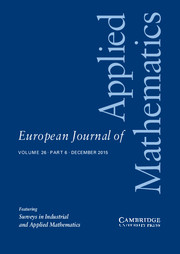No CrossRef data available.
Article contents
Reconciliation of probability measures
Published online by Cambridge University Press: 17 December 2018
Abstract
We discuss the reconciliation problem between probability measures: given n⩾2 probability spaces  $(\Omega,{\mathcal{F}}_1,{\mathbb{P}}_1),\ldots,(\Omega,{\mathcal{F}}_n,{\mathbb{P}}_n)$ with a common sample space, does there exist an overall probability measure
$(\Omega,{\mathcal{F}}_1,{\mathbb{P}}_1),\ldots,(\Omega,{\mathcal{F}}_n,{\mathbb{P}}_n)$ with a common sample space, does there exist an overall probability measure  ${\mathbb{P}} \ \text{on} \ {\mathcal{F}} = \sigma({\mathcal{F}}_1,\ldots,{\mathcal{F}}_n)$ such that, for all i, the restriction of
${\mathbb{P}} \ \text{on} \ {\mathcal{F}} = \sigma({\mathcal{F}}_1,\ldots,{\mathcal{F}}_n)$ such that, for all i, the restriction of  ${\mathbb{P}} \ \text{to} \ {\mathcal{F}}_i$ coincides with
${\mathbb{P}} \ \text{to} \ {\mathcal{F}}_i$ coincides with  ${\mathbb{P}}_i$? General criteria for the existence of a reconciliation are stated, along with some counterexamples that highlight some delicate issues. Connections to earlier (recent and far less recent) work are discussed, and elementary self-contained proofs for the various results are given.
${\mathbb{P}}_i$? General criteria for the existence of a reconciliation are stated, along with some counterexamples that highlight some delicate issues. Connections to earlier (recent and far less recent) work are discussed, and elementary self-contained proofs for the various results are given.
MSC classification
- Type
- Papers
- Information
- European Journal of Applied Mathematics , Volume 30 , Special Issue 6: Applied Optimal Transport , December 2019 , pp. 1300 - 1310
- Copyright
- © Cambridge University Press 2018


